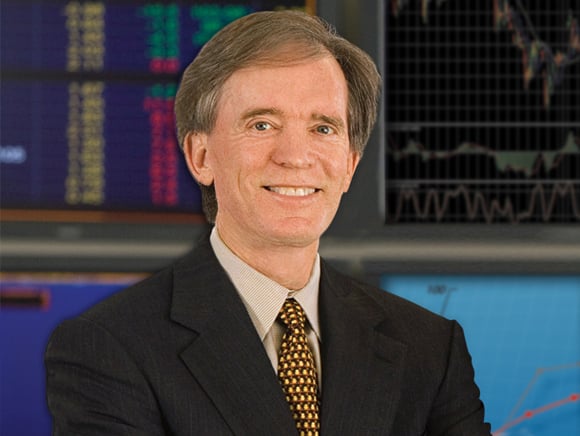Pimco bond king hikes negative play on Treasuries; inflation 'the ultimate factor'
Bill Gross, who runs the world's biggest bond fund at Pacific Investment Management Co., increased his bet against U.S. government debt in April just as Treasuries had their biggest rally in eight months.
Pimco's $240.7 billion Total Return Fund had minus 4 percent of its assets in government and related debt, versus negative 3 percent in March. Cash and equivalents, the largest component, rose to 37 percent of holdings from 31 percent. Mortgage bonds declined to 24 percent from 28 percent, the Newport Beach, California-based company said on its website.
Gross, 67, has been warning that the threat of inflation will be bad for Treasuries even as other investors snapped up the securities. U.S. government debt returned 1.15 percent in April, the most since August, according to Bank of America Merrill Lynch data. Yields will stay low, Jim Caron, the New York-based global head of interest-rate strategy at Morgan Stanley, wrote in a report.
“We sold Treasuries and we bought other bonds,” Gross said in a May 6 interview with Tom Keene on Bloomberg Radio's “Bloomberg Surveillance.” Pimco expects “a mild bear market in bonds. Inflation I think is the ultimate factor. It threatens, in my view, to move slightly higher.”
Monthly Return
U.S. debt has returned another 0.7 percent in May, the Bank of America figures show. Benchmark 10-year yields were little changed at 3.16 percent as of 11:21 a.m. in Tokyo. They fell to 3.13 percent on May 6, the lowest since December.
Real 10-year yields, or the difference between the consumer price index and the Treasury rate, declined to 0.45 percent on May 6, the least since 2008. Based on two-year Treasuries, the real yield is negative 2.15 percent.
The difference between rates on 10-year notes and Treasury Inflation Protected Securities, a gauge of trader expectations for consumer prices over the life of the debt, has widened to 2.49 percentage points from 2.12 percentage points six months ago. The average over the past decade is 2.10 percentage points.
Pimco's Total Return Fund returned 7.4 percent in the past year, beating 84 percent of its peers, according to data compiled by Bloomberg. The fund gained 1.6 percent in the past month, better than about 30 percent of its competitors. Pimco is a unit of Munich-based insurer Allianz SE.
TIPs
The Total Return Fund held TIPS equal to 3 percent of assets and had no Treasuries or U.S. agency debt at the end of April, the figures in its website showed. It had a negative 7 percent allocation to other government-related securities, a category that can include interest-rate swaps, Treasury futures and options and corporate securities guaranteed by the Federal Deposit Insurance Corp., according to Pimco.
The fund can have a so-called negative position by using derivatives, futures or by shorting. Shorting is borrowing and selling an asset in anticipation of making a profit by buying it back after its price has fallen.
U.S. employment isn't strong enough to get the Federal Reserve to raise interest rates, Morgan Stanley's Caron wrote in his May 6 report. The central bank has kept its target for overnight lending in a range of zero to 0.25 percent since December 2008 to support the economy.
“We expect yields to remain low,” Caron wrote. “Only if short-rate expectations materially started to rise would we change this view.”
Rate Bets
The odds of a Fed increase by March have fallen to 33 percent from 61 percent a month ago, futures contracts indicate. Investors were reassured by Fed Chairman Ben S. Bernanke, who said April 27 that the central bank will keep reinvesting proceeds of maturing debt after ending large-scale bond purchases in June.
The benchmark target at virtually zero poses an immediate threat to bondholders amid accelerating inflation and negative real yields, Gross wrote in his May investment outlook.
“Holding Treasuries at these yield levels for an extended period of time represents an abdication of responsibility,” Gross wrote.
--Bloomberg News--







